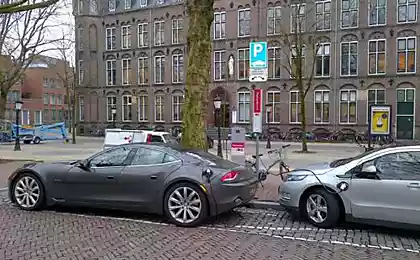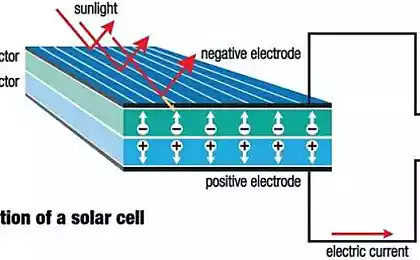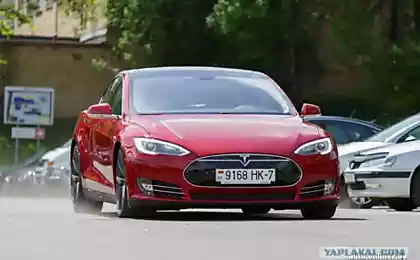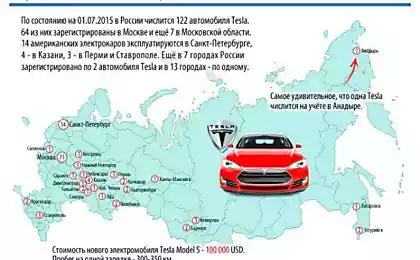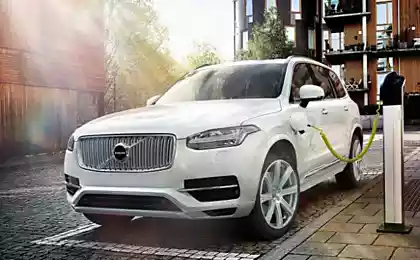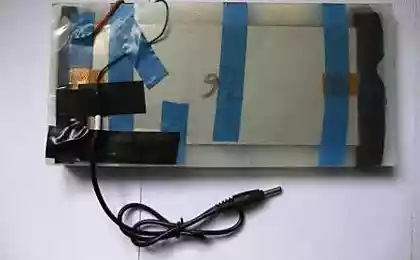458
A new battery will increase the cruising range of electric vehicles up to 1000 km
Electric cars are evolving quickly thanks to the participation of large companies in development and testing. But they are still not able to walk long distance without any additional charge. Scientists from the Fraunhofer seriously thinking about this problem and introduced a new type of battery for electric vehicles.
Twenty six million sixty six thousand one hundred ten
Current models of electric cars equipped with batteries. Basically, they consist of hundreds of thousands of individual components, taking up much space in the housing. For the proper functioning of batteries in electric cars require more than 50% of the whole space of the body. Complex design fraunhoferstr prompted researchers to come up with a more compact design for battery electric cars. And they did — a new bipolar principle-based fuel cells lithium batteries presented at the Research Institute for ceramic technologies and systems (IKTS) in Dresden, Germany. The project was named "EMBATT".
The new approach allowed to refuse individual elements of the battery in small areas. Instead, they are placed directly above each other. Via direct connection of cells in the stack, the current flows across the surface of the battery. The electrical resistance in this case is greatly reduced. In the result, the main problems of compactness and connection of components resolved. This, in turn, has led to a potential increase in the number placed in the body of the battery.
"With our new design we hope to increase the range of autonomy of electric cars in the medium term, up to 1,000 km," — said Dr. AIDS Voltaire (Mareike Wolter), project Manager at the Institute IKTS.Scientists have solved the question of conservation of energy. As you know, the most important component of a battery is a bipolar electrode. It is a metallic tape coated with ceramic material on both sides. The result is that one side becomes the anode, while the other is obviously the cathode. In General, this design can be called the "heart" of the battery, because it is through the bipolar electrode energy is saved. In the case of technology Dr. Voltaire ceramic material is used in powder form. It is mixed with polymers and conductive materials to form slurry. Subsequently, the resulting suspension is applied to the ribbon.
Seventy three million seven hundred fifty one thousand nine hundred thirty two
"We use our experience in the development of ceramic technology for the design of the electrodes c the minimum amount of space. This saves a lot of energy and increase the battery life," explained Dr. Walter.The next step in the development of the project EMBATT is the development of large battery cells and their installation in electric vehicles. As of now a new type of battery has already attracted two partners of ThyssenKrupp System Engineering and IAV Automotive Engineering. The first tests are planned by 2020. published
P. S. And remember, only by changing their consumption — together we change the world! ©
Source: //ecotechnology
Twenty six million sixty six thousand one hundred ten
Current models of electric cars equipped with batteries. Basically, they consist of hundreds of thousands of individual components, taking up much space in the housing. For the proper functioning of batteries in electric cars require more than 50% of the whole space of the body. Complex design fraunhoferstr prompted researchers to come up with a more compact design for battery electric cars. And they did — a new bipolar principle-based fuel cells lithium batteries presented at the Research Institute for ceramic technologies and systems (IKTS) in Dresden, Germany. The project was named "EMBATT".
The new approach allowed to refuse individual elements of the battery in small areas. Instead, they are placed directly above each other. Via direct connection of cells in the stack, the current flows across the surface of the battery. The electrical resistance in this case is greatly reduced. In the result, the main problems of compactness and connection of components resolved. This, in turn, has led to a potential increase in the number placed in the body of the battery.
"With our new design we hope to increase the range of autonomy of electric cars in the medium term, up to 1,000 km," — said Dr. AIDS Voltaire (Mareike Wolter), project Manager at the Institute IKTS.Scientists have solved the question of conservation of energy. As you know, the most important component of a battery is a bipolar electrode. It is a metallic tape coated with ceramic material on both sides. The result is that one side becomes the anode, while the other is obviously the cathode. In General, this design can be called the "heart" of the battery, because it is through the bipolar electrode energy is saved. In the case of technology Dr. Voltaire ceramic material is used in powder form. It is mixed with polymers and conductive materials to form slurry. Subsequently, the resulting suspension is applied to the ribbon.
Seventy three million seven hundred fifty one thousand nine hundred thirty two
"We use our experience in the development of ceramic technology for the design of the electrodes c the minimum amount of space. This saves a lot of energy and increase the battery life," explained Dr. Walter.The next step in the development of the project EMBATT is the development of large battery cells and their installation in electric vehicles. As of now a new type of battery has already attracted two partners of ThyssenKrupp System Engineering and IAV Automotive Engineering. The first tests are planned by 2020. published
P. S. And remember, only by changing their consumption — together we change the world! ©
Source: //ecotechnology


